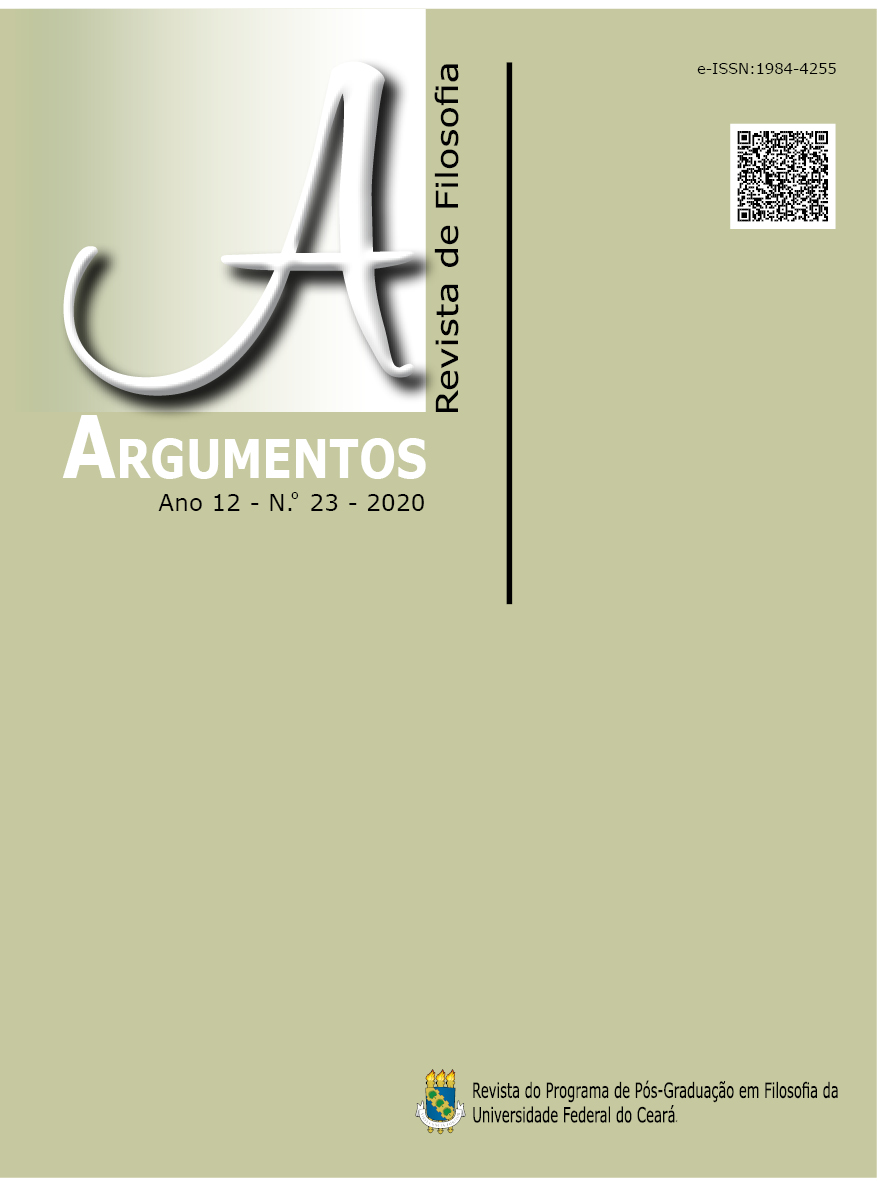Le cas Heidegger
DOI:
https://doi.org/10.36517/Argumentos.23.10Keywords:
Heidegger. Nazismo. Responsabilidade.References
BATAILLE, G. – WEIL, E. À en-tête de Critique. Paris: Lignes, 2014.
CASSIN, B. Nous savions tous que heidegger avait été nazi. In: https://bibliobs.nouvelobs.com/essais/20140919.OBS9704/barbara-cassin-nous-savions-tous-que-heidegger-avait-ete-nazi.html.
DI CESARE, D. Heidegger e gli ebrei. I Quaderni neri. Torino: Bollati Boringhieri, 2014.
DI CESARE, D. I Quaderni neri di Heidegger. Milano, Mimesis, 2016.
FARÍAS, V. Heidegger y el nazismo. Fondo de Cultura Económica, Santiago, 1998.
FAYE, E. Heidegger, l’introduction du nazisme dans la philosophie. Paris: Albin Michel, 2005.
GUIBAL, F. Philosophie, modernité, politique. Eric Weil, critique de Martin Heidegger. Revue des Sciences Religieuses 75/2 (2001), p. 190-219.
JANICAUD, D. L’ombre de cette pensée. Heidegger et la question politique. Paris: Jérôme Millon, 1990.
KIRSCHER, G. Eric Weil ou la raison de la philosophie. Villeneuve d’Ascq, Press Universitaires du Septentrion, 1999.
KOONZ, C. La consciência nazi. La formación del fundamentalismo étnico del Tercer Reich. Barcelona: Paidos, 2005.
LOSURDO, D. Heidegger’s black notebooks aren’t that surprising. In: https://www.theguardian.com/commentisfree/2014/mar/19/heidegger-german-philosopher-black-books-not-surprising-nazi.
LÖWITH, K. Les implications politiques de la philosophie de l’existence chez Heidegger. Les Temps Modernes 14 (1946), p. 343-360.
LYRA, E. Sobre a recepção dos Cadernos Negros de Heidegger. O que nos faz pensar 36 (2015), p. 53-74.
NANCY, J.-L. Banalité de Heidegger. Paris: Galilée, 2015.
QUILLIEN, J. Philosophie et politique Heidegger, nazisme et la pensée française. Germanica 8 (1990), p. 103-142.
QUILLIEN, J. Heidegger et Weil, le destructeur et le bâtisseur. Cahiers philosophique 10 (1982), p. 7-62.
RÉE, J. In defense of Heidegger. In: http://www.prospectmagazine.co.uk/arts-and-books/in-defence-of-heidegger.
REY, J.-F. Écouter le philosophe, juger le citoyen ? Eric Weil et le cas Heidegger. In LESCOURRET, M.-A. (Ed.). La dette et la distance. De quelques élèves et lecteurs juifs de Heidegger. Paris: Editions de l’Éclat, 2014, p. 223-232.
ROUANET, B. Habermas e Heideiier: uma discórdia filosófica - reflexões sobre os Cadernos negros de Heidegger. Sociedade e Estado 31, (2016), p. 955-968.
STEPHAN, D. Martín Heidegger y los Cuardenos Negros: más que la mera reactivación de un viejo debate. Alpha 42 (2016), 235-251.
TOWARNICKI, F. Visite à Martin Heidegger. Les Temps Modernes 4 (1946), p. 717-724.
VON HERRMANN, F. – ALFIERI, F. Martin Heidegger. La verità sui Quaderni neri. Brescia: Morcelliana, 2016.
WAELHENS, A. La philosophie de Martin Heidegger et le nazisme. Les Temps Modernes 22 (1947), p. 115-127.
WEIL, E. Le cas Heidegger. Les Temps Modernes 2/22 (1947), 128-138; Lignes 2 (1987), p. 139-151.
WEIL, E. Il caso Heidegger. Trad. G. Ciafrè. Belfagor 49/1 (1994), p. 55-64.
WEIL, E. Essais et conférences 1. Paris: Vrin, 1991a.
WEIL, E. Essais et conférences 2. Paris: Vrin, 1991b.
WEIL, E. Hegel et l’Etat. Paris: Vrin, 2002.
WEIL, E. Philosophie et réalité 1. Paris: Beauchesne, 2003a.
WEIL, E. Philosophie et réalité 2. Paris: Beauchesne, 2003b, p. 254-266.
WEILL, N. Heidegger et les Cahiers noirs. Mystique du ressentiment. Paris: CNRS, 2018.
WOLIN, R. La politique de l’être. La pensée politique de Martin Heidegger. Paris: Kimé, 1992.
Downloads
Published
Issue
Section
License
Argumentos magazine is licensed under an International Creative Commons Attribution License.
The Magazine uses CC BY inclusion
1) The authors retain the copyright granted to the magazine or the right to initial publication, with the work regularly licensed under the Creative Commons Attribution, which allows the sharing of the work with acknowledgment of authorship and initial publication in this magazine.
2) The authors are authorized to contract additional applicable contracts, for non-exclusive distribution of the version of the work published in this journal (for example, publication in the institutional repository or as a chapter of the book), recognition of authorship and initial publication in this journal.
3) Authors are authorized and encourage to publish and distribute their work online (for example, in institutional repositories or on their personal pages) at any time before or during the editorial process, as they can generate productive changes, as well as increase the impact and reference of published work.




.jpg)










._._3.png)
1.jpg)
._._._.png)
